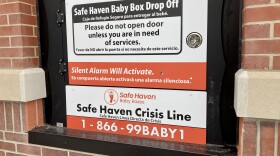The Kentucky Supreme Court has issued a ruling that keeps the state’s two near-total bans on abortion in place and remanded the case back to the trial court for constitutional review.
Jefferson County Circuit Court Judge Mitch Perry last year blocked enforcement of the state’s “trigger law,” which bans abortion in nearly all cases, and a separate six-week ban.
The state Court of Appeals reversed that ruling, allowing the abortion bans to go into effect last August. And now, in a 150-page opinion, Supreme Court justices have upheld that decision.
The high court heard arguments on the case in mid-November, shortly after voters rejected an amendment that would have added anti-abortion language to the state constitution.
During that hearing, providers argued the bans violate patients' right to privacy under the state constitution.
ACLU attorney Heather Gatnarek argued the bans were interfering with patients and doctors' ability to make medical decisions.
“Doctors should not be placed into a situation where they are left to watch their patient deteriorate before they meet one of these very narrow exceptions," Gatnarek said.
Kentucky Attorney General Daniel Cameron has said there is no protection for abortion under the state constitution, which Kentucky Solicitor General Matt Kuhn reiterated to the justices during the hearing.
“It is not pro-choice or pro-life, so the question must be left to the General Assembly,” Kuhn said. “That Kentuckian who wants abortion rights should pick up the phone and call their assembly member.”
Kentucky became one of the first states to block most abortions following the United States Supreme Court decision to overturn Roe v. Wade.
The 2019 trigger ban makes it a class D felony punishable by up to five years in prison for anyone performing an abortion through procedure or medication.
There’s a narrow exception if an abortion is necessary to prevent death or “serious, permanent impairment of a life-sustaining organ” of the pregnant person, according to the law.
The patient would not face a criminal charge for an abortion under Kentucky’s current regulatory scheme. But some Republican lawmakers have proposed changing that.
Republican Rep. Emily Callaway, of Louisville, recently introduced a bill that would allow people who have abortions deemed illegal under state law to be charged with homicide.
Unlike a ban in Indiana, which is blocked but also before the state Supreme Court, Kentucky’s law has no exceptions for rape, incest or unviable pregnancies.
Ryland Barton and Divya Karthikeyan contributed to this story.








